WASHINGTON, DC – Two dozen US Senators and Representatives joined on Capitol Hill ahead of April 24th, the international day of justice for the Armenian Genocide, to warn against Azerbaijan’s ongoing attempts to ethnically cleanse the 120,000 Christian Armenians living in freedom upon their indigenous Artsakh homeland, reported the Armenian National Committee of America (ANCA).
“The message today from Capitol Hill to President Biden is, very simply: ‘Prevent a second Armenian Genocide; stop sending American arms and aid to Azerbaijan,’” said ANCA executive director Aram Hamparian. “President Biden cannot credibly condemn the Armenian Genocide while arming and abetting the racist, oil-rich dictatorship hell-bent on completing this very crime.”
The annual Capitol Hill Armenian Genocide observance, organized in cooperation with the Congressional Armenian Caucus, was streamed live on the ANCA’s social media platforms.
Congressional Armenian Caucus founding co-chair Frank Pallone (D-NJ) praised the Armenian American community’s persistence in securing Congressional and then Presidential recognition of the Armenian Genocide in 2019 and 2021, respectively, but stressed that there is more work to do. “What we see happening in Artsakh, both with the attack, the aggression that took place a couple of years ago, and the cutting off of the Lachin Corridor, in my opinion, is nothing more a continuation of the Genocide,” stated Pallone. “We know the people in Artsakh are suffering, not having enough food, not having medical supplies. To me, that sounds like genocide, but we’re not going to allow it to happen,” concluded Rep. Pallone.
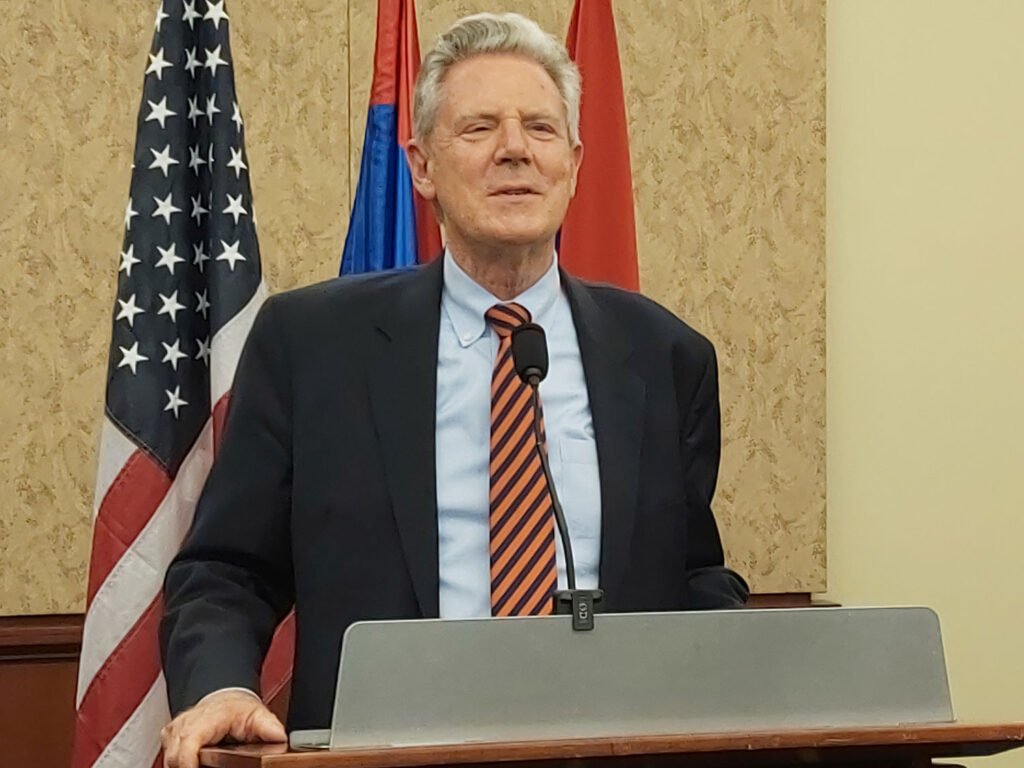
Senate Foreign Relations Committee chairman Robert Menendez (D-NJ), whose wife Nadine’s grandfather was killed during the Armenian Genocide, discussed the “acute humanitarian crisis” in Artsakh resulting from Azerbaijan’s blockade, their ongoing torture and murder of POWs and aggression against Armenia and Artsakh. “Suffice it to say that I’m strongly opposed to having any aid go to a fighting force known for war crimes and aggression against a neighbor state. We should not be in bed with governments like Azerbaijan. It’s inexcusable. It’s morally repugnant. It’s got to stop.” He also noted that continued US security assistance to Azerbaijan “not only damages American national security interests, it flies in the face of our duty to honor the victims and survivors of the Armenian Genocide and our duty to ensure that history does not repeat itself again.”
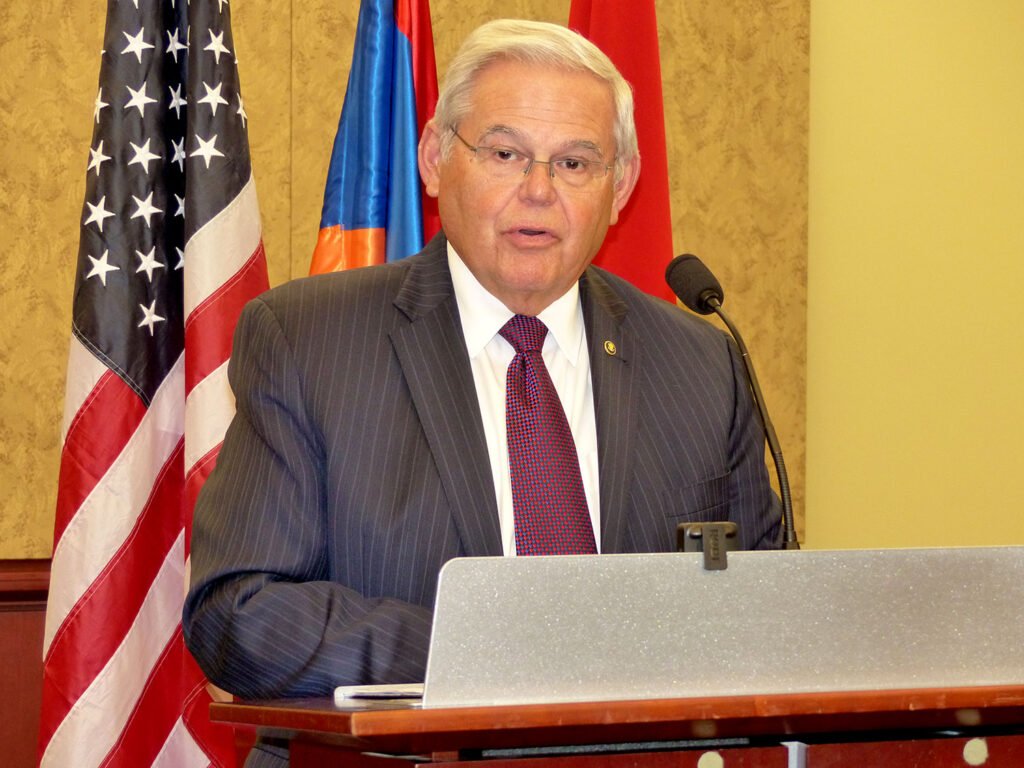
Speaker Emerita Nancy Pelosi (D-CA), citing her historic Congressional trip to Armenia last year, noted the significance of the Capitol Hill Armenian Genocide commemoration. “As we make clear by tonight’s meeting, preventing a second Armenian Genocide, we must ensure that these atrocities never happen again. There must be a negotiated, comprehensive and lasting settlement to this conflict so that we can pave a way to peace and security. Make no mistake, support for the Armenian people transcends partisanship and politics.”
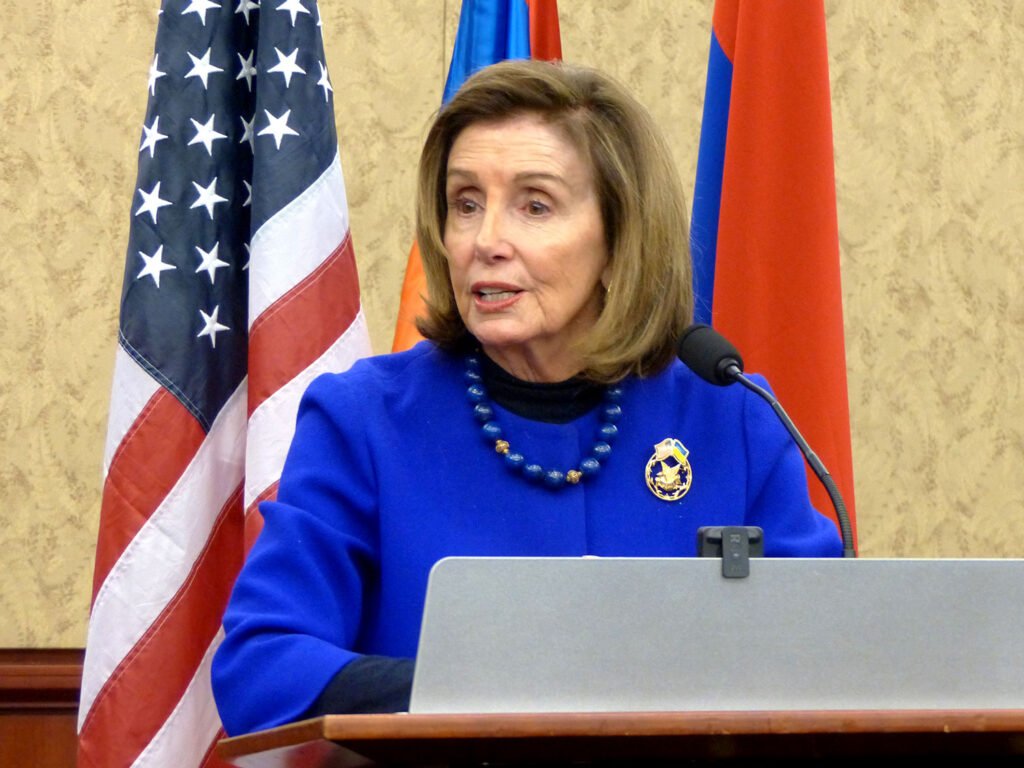
California Senator Alex Padilla announced his upcoming introduction of a Senate resolution condemning Azerbaijan’s Artsakh blockade. “And after condemning Azerbaijan, I’m urging the United States government to take immediate steps to end the ongoing and growing humanitarian crisis. The US government needs to live up to its word that we will never ignore the warning signs of genocide, and we will never let this happen again. It is time to act,” concluded Senator Padilla.
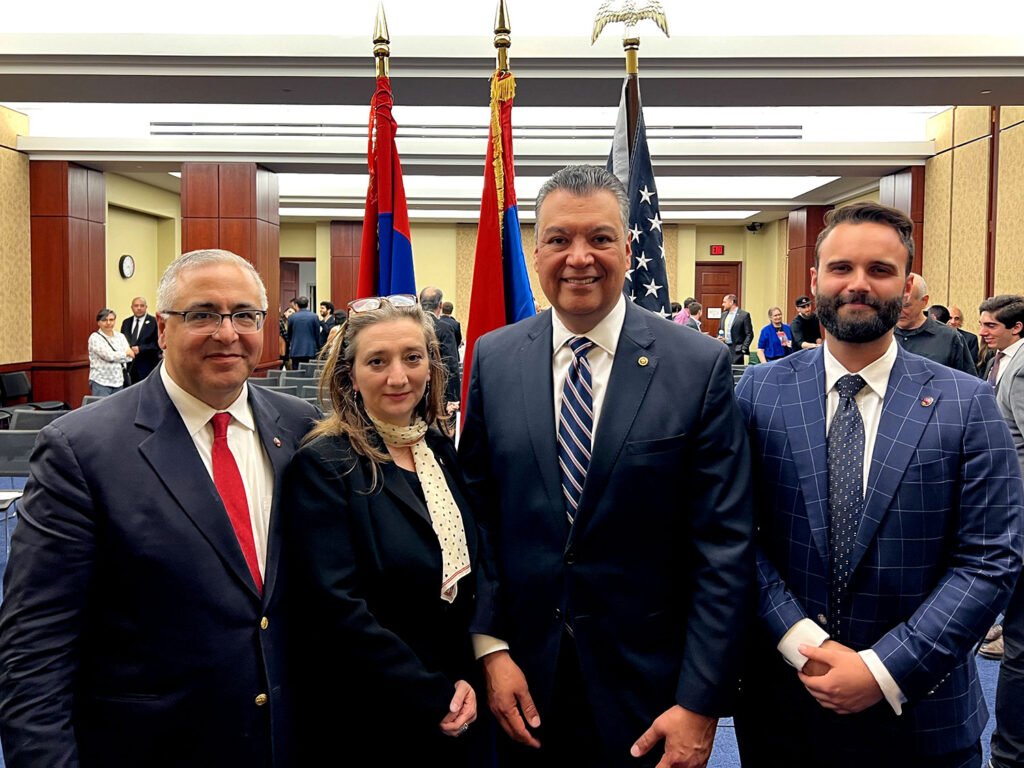
Rep. Adam Schiff (D-CA) noted, “Armenians are still under attack today, including those who lost their lives in Artsakh, many forced to flee from the unprovoked aggression of Azerbaijan and Turkey, Azerbaijan’s unprovoked assault on the sovereign territory of Armenia, and the thousands of Armenians who remain at risk of another genocide as Azerbaijan tries to drive them out of Artsakh and Armenia.” Rep. Schiff warned, “Over the past few months we’ve reached a critical point in the hostility of Azerbaijan towards Armenia and Artsakh. And I can tell you I’ve never been more concerned than I am today that Azerbaijan may intend another all-out war on Armenia and Artsakh.”
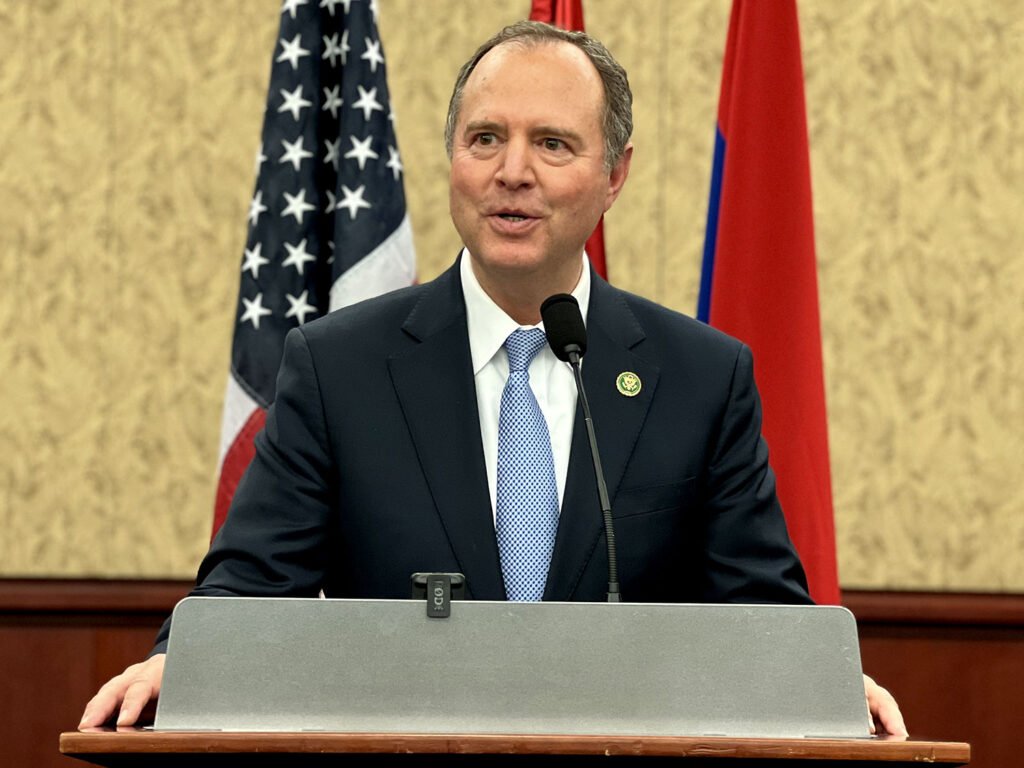
Rep. David Valadao (R-CA) reminisced about the powerful impact of his trip to Artsakh in 2017, noting, “And it was an interesting experience to go there [Artsakh] and see for myself these people that have fought for themselves, have defended their nation and did everything they possibly could to be a free society. […] And it’s something that I know across the aisle, both Democrat and Republican, we’re going to continue to fight to work to resolve this as quickly as we possibly can.”
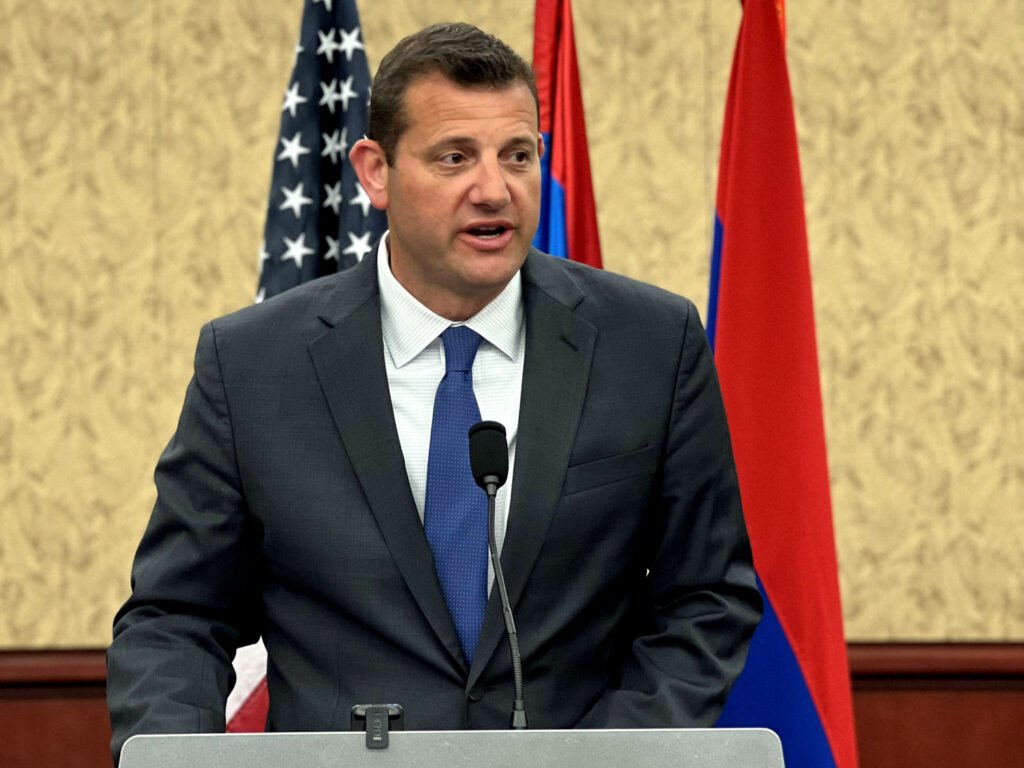
Members of Congress also pledged support for the Armenian Genocide Education Act set to be introduced next week, spearheaded by Representatives Anna Eshoo (D-CA), Gus Bilirakis (R-FL), Ted Lieu (D-CA), and Rep. Valadao. This landmark legislation – strongly supported by the ANCA – seeks to provide $10 million in funding over five years for the Library of Congress to educate Americans about Ottoman Turkey’s systematic and deliberate state-sponsored mass murder, national dispossession, cultural erasure and exile of millions of Armenians, Greeks, Assyrians, Chaldeans, Syriacs, Arameans, Maronites and other Christians, between 1915 and 1923.
Additional Senate and House Members who offered powerful remarks throughout the evening included: Senator Cory Booker (D-NJ), and Representatives: Judy Chu (D-CA), Jim Costa (D-CA), Young Kim (R-CA), Mike Lawler (R-NY), Seth Magaziner (D-RI), Grace Meng (D-NY), Katie Porter (D-CA), Brad Schneider (D-IL), Brad Sherman (D-CA), Abigail Spanberger (D-VA), Eric Swalwell (D-CA), and Dina Titus (D-NV). Senator Ed Markey (D-MA) and Representatives Josh Gottheimer (D-NJ), Kevin Mullin (D-CA) and Rashida Tlaib (D-MI) also joined in the solemn Armenian Genocide remembrance.
Artsakh Representative to the US Robert Avetisyan stressed that there was a “different sense of urgency” during this year’s commemoration. “It is clear for us in Artsakh and increasingly in Armenia that there is a historic opportunity to de-Armenize Artsakh, to take control and eventually modify or destroy the first Armenian Church. To take control, cut the cross, transform our millennial churches. Yes, there is a historic opportunity for Erdogan to do what he promised to do in 2020, when they paired up with Azerbaijan in international terrorism and attacked Artsakh. There’s a historic opportunity for them to finish the deal and mission of their forefathers in the Caucasus. The blockade continues. The threats continue. The attempt at ethnic cleansing continues. So should our struggle.”
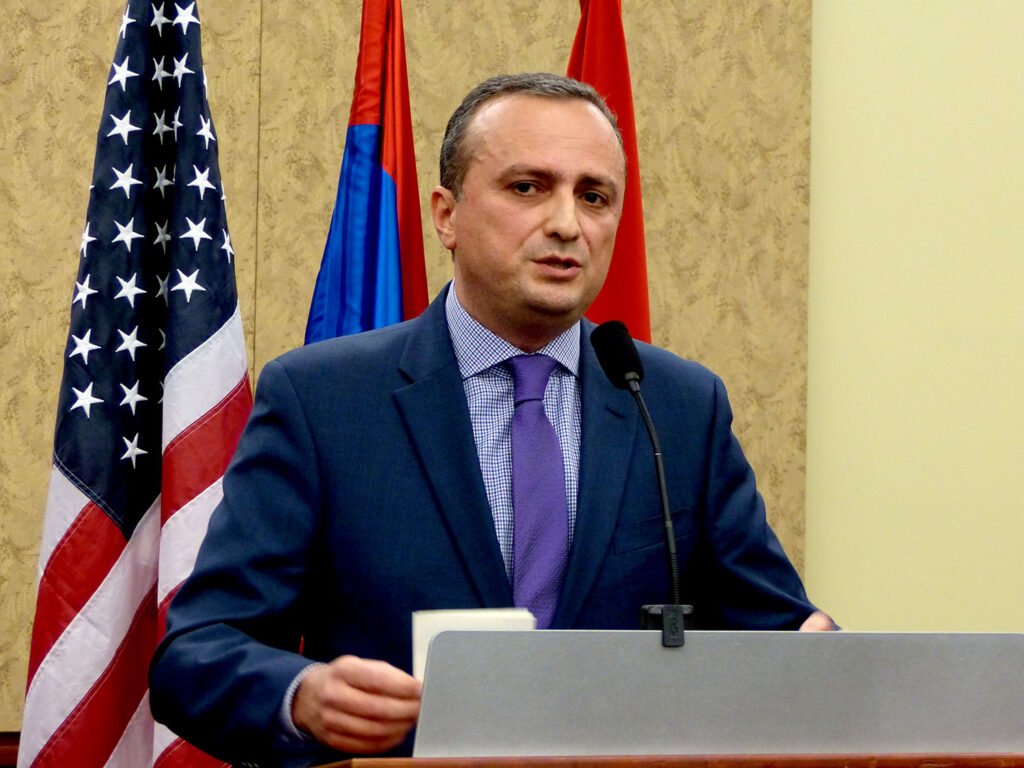
Keynote speaker Dr. Michael Rubin, a senior fellow of the American Enterprise Institute, made a powerful case against the presidential waiver of Section 907 restrictions on US military assistance to Azerbaijan. “Section 907 and the waiver of Section 907 is ingrained in law. To make excuses inside the State Department is an affront not to Democrats, not to Republicans, but to the entire Congress. This is about respect for Congress, respect for the law. If anyone wants to traffic military equipment to Azerbaijan, when President Aliyev makes it very clear in his statements, including his statement yesterday, that he intends to affect population transfer, ethnic cleansing and so forth, let that Congressman or Senator stand up and say that we need to sell weaponry to Azerbaijan despite what we see is a looming resumption of genocide.”
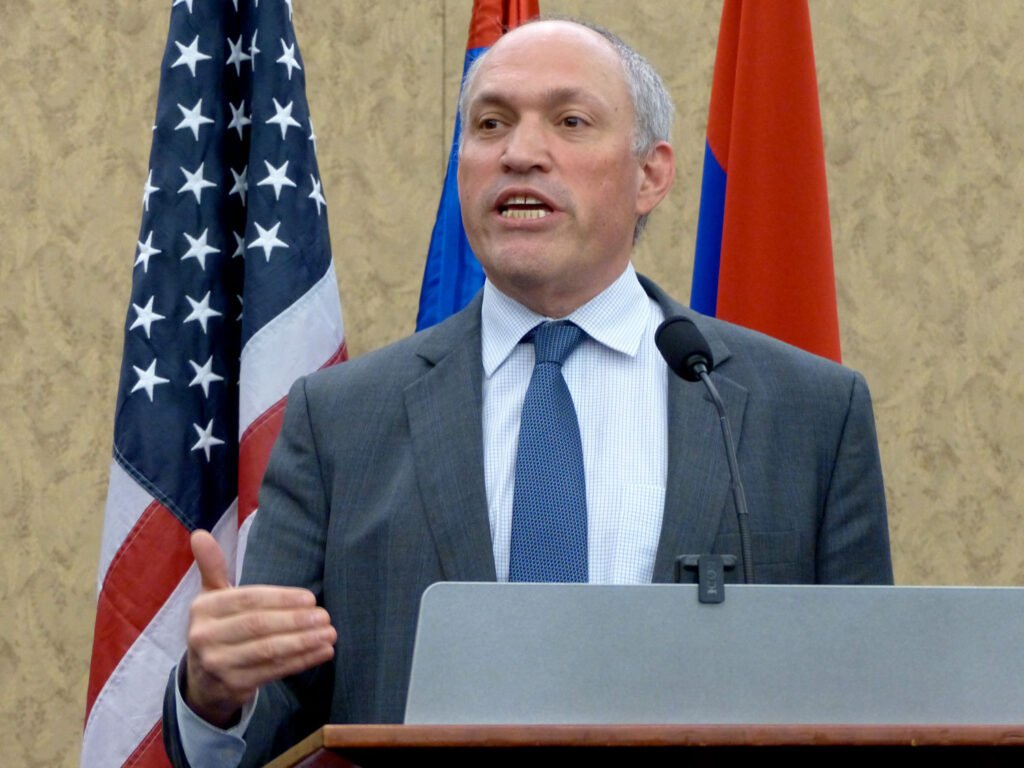
The Armenian Genocide commemorative evening spotlighted the vibrant coalition of organizations standing with Artsakh and Armenia as they face Azerbaijan’s genocidal actions. Hellenic American Leadership Council Government Affairs director Dean Tsilikas served as master of ceremonies of the evening. Several ANCA coalition partners offered remarks, including In Defense of Christian executive director Richard Ghazal, American Friends of Kurdistan president Diliman Abdulkader and A Demand for Action executive director Steve Oshana.
Congressional Armenian Staff Association chair Maria Martirosyan Issakhanian stressed the impact of the Armenian Genocide on the commitment of Armenian American staffers to bring about positive change. “While centuries of persecution and displacement may have resulted in lost family histories, generational trauma and lost economic opportunities, it has also instilled in us the ability to survive, persevere and thrive. And today, Armenian-American congressional staff harness their experience, strengths and talents to help shape the future of this nation and the world.”
His Eminence Archbishop Anoushavan Tanielian, Prelate of the Eastern Prelacy of the Armenian Apostolic Church of the United States, offered a stirring invocation sharing the Armenian American experience, noting, “We will walk despite awful deniers, distortions and oppressions. For our patience is deeper than the oceans. Our aspirations are higher than the mountains. Our will and our commitment are as solid as granite. […] May we carry our yoke consciously and willingly for the ultimate victory of truth, justice and peace.”
Hamparian and Armenian Assembly of America National Board member Aram Gavoor also offered remarks.
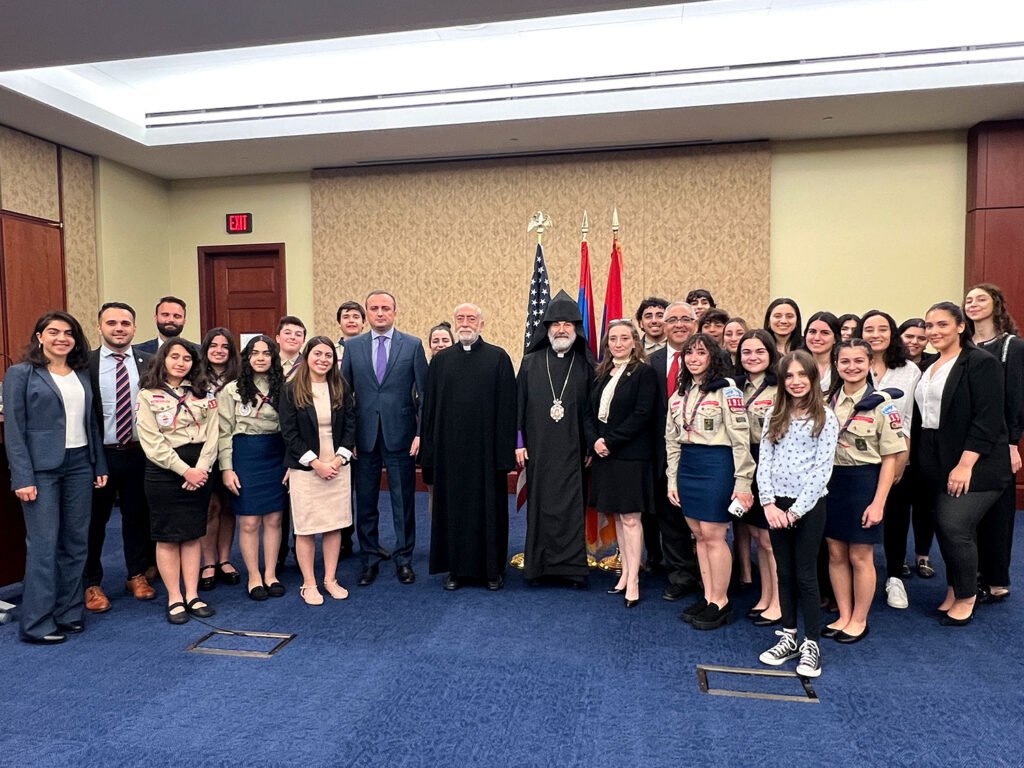
Highlights of Congressional and Coalition Organization Remarks in Solidarity of Artsakh and Armenia and Marking the 108th Anniversary of the Armenian Genocide:
Senator Cory Booker (D-NJ): “We are united in our commitment to Armenian sovereignty, we’re united in our commitment to human rights, and we’re going to continue to do everything we can to avoid a humanitarian crisis. Now more than ever, we have to acknowledge our shared responsibility. Now more than ever we have to call out violence against innocent people in all shapes and forms. And I want to say thank you because the work cannot stop.”
Rep. Judy Chu (D-CA): “I am proud to be one of the only members of Congress to visit both Armenia and Artsakh. And I saw for myself what a beautiful place Artsakh was. But I do have to tell you that Azerbaijan warned me not to go, so when I came back, they banned me from the country. Yeah. And it’s a badge of honor, yes. And it actually strengthened my resolve to stop Azerbaijan’s continued aggression and their illegal plundering of Artsakh, it made me even more determined to stand by the people of Armenia and Artsakh as they struggle for their right to self-determination.”
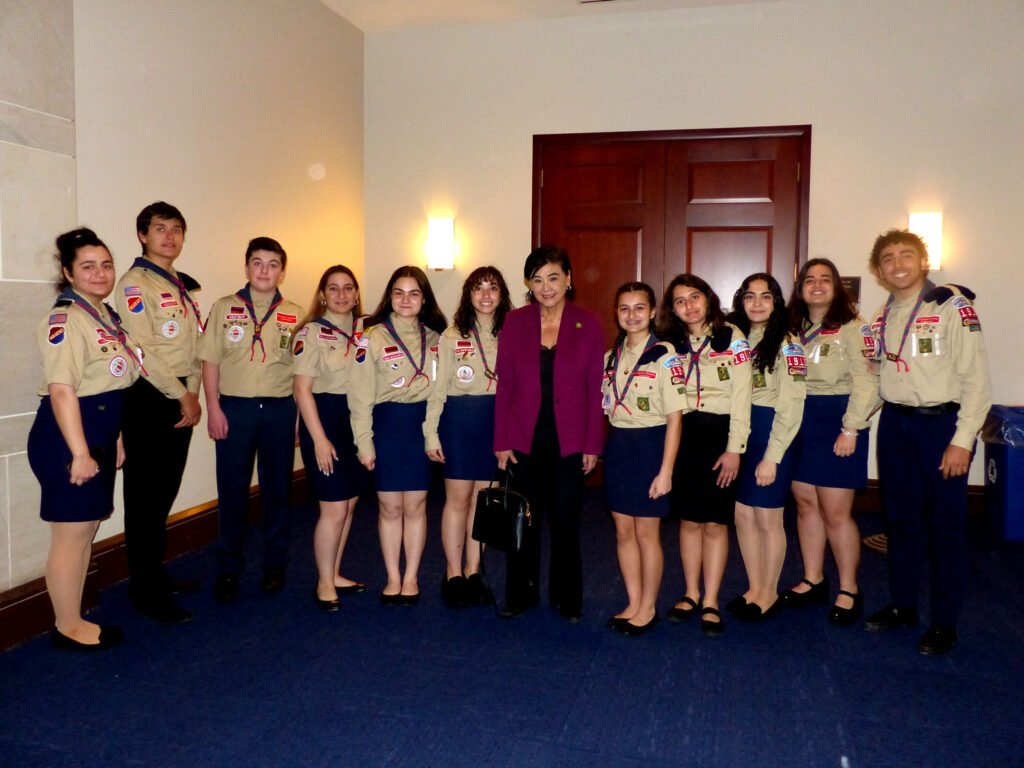
Rep. Jim Costa (D-CA): “Many of you have heard me say it before, my name is Aram. I come from the land of William Saroyan. With fondness and deep appreciation and a great deal of pride, the Armenian diaspora obviously found its way into so many parts of our country and the world. […] With the situation in Artsakh today, more work needs to be done. Once again, Azerbaijan is demonstrating its disregard for its respect of a sovereign nation, and a people that they are neighbors with. And the world is watching.”
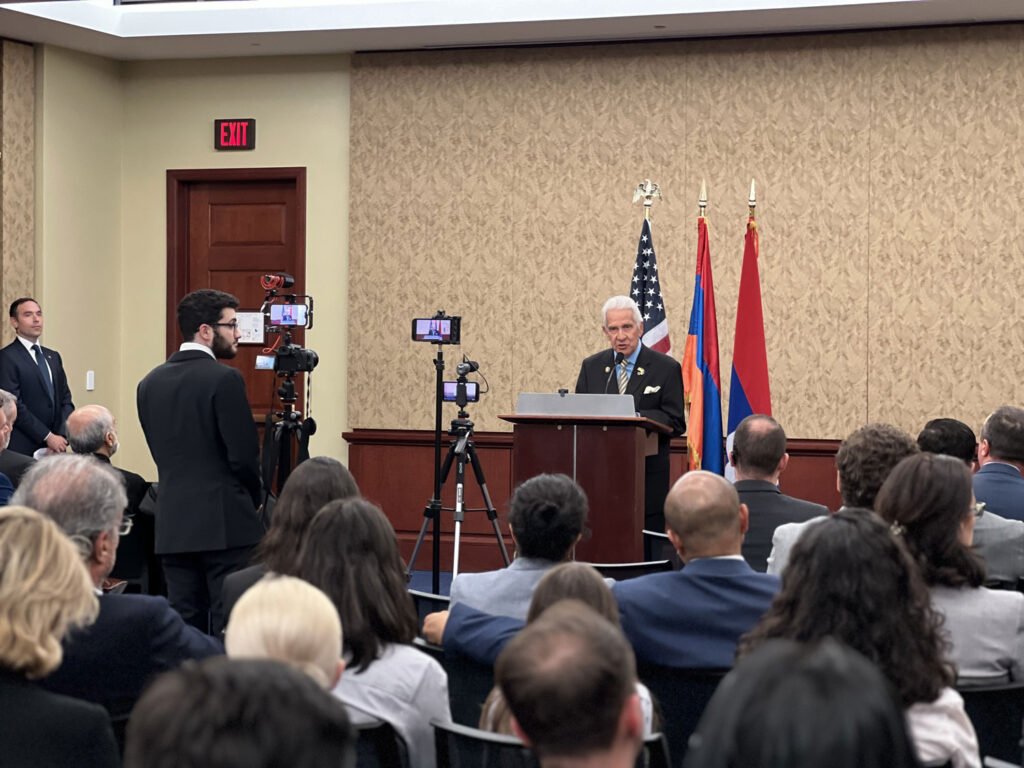
Rep. Young Kim (R-CA): “I am proud to co-sponsor the Armenian Genocide Education Act in the 117th Congress, and I look forward to continuing to work with my colleagues to advocate for the genocide recognition or lifting the blockade or attending local community events. I have a lot of friends in the Armenian American community. I’m proud to continue to be an advocate for you so please consider me as one of your strongest friends and advocate here working on your behalf, being your voice.”
Rep. Mike Lawler (R-NY): “As we remember the Armenian Genocide, we must also acknowledge the conflict over Artsakh. Most recently in this chapter, Azerbaijan launched a blockade around Artsakh. This blockade is causing immense suffering to the Armenian people living there. It is a violation of their human rights. We must work towards ending this blockade, ensuring that Artsakh has access to necessary resources like food and medicine. As we stand here today, we not only remember the past, but also support the present and the future of the Armenian people.”
Rep. Seth Magaziner (D-RI): “As we speak today, 120,000 Armenians are trapped, cut off from food, medicine and fuel, part of Azerbaijan’s longstanding campaign of aggression. Together with my colleagues from the Congressional Armenian Caucus, we have requested $50 million of funding for rebuilding and resettling efforts, including food, energy, security, Internet access, maternal health care and water. We have requested restriction of military assistance to Azerbaijan, urging Azerbaijan to free Armenian prisoners of war. The blockade of Artsakh must end, and it must end now.”
Rep. Grace Meng (D-NY): “As part of these remembrance efforts, I am proud to be a co-sponsor of the Armenian Genocide Education Act, which would promote greater public awareness and understanding of the history, lessons, consequences and ongoing costs of the Armenian Genocide. Not only do we need to remember the past, but we must recognize the ongoing tragedies right in front of us. The blockade of Artsakh is simply unacceptable. Families and their lives have been turned upside down. I know many of you in this room have family, friends and loved ones in Artsakh who continue to be impacted by Azerbaijan’s hateful policies. Please know that I and my colleagues stand with you in calling for the end to this unjust blockade.”
Rep. Katie Porter (D-CA): “The goal is clear, to force the ethnic Armenians of Artsakh from their homeland by imposing conditions that make life impossible. Our response must also be clear. We must hold Azerbaijan accountable for its aggression, and I will keep calling, and if needed, pushing, the Biden administration to be proactive in taking steps to end this blockade. American taxpayers should not be subsidizing Azerbaijan’s hostility against the Armenian people. As long as the aggression continues, Azerbaijan should not receive any military assistance.”
Rep. Brad Schneider (D-IL): “As we gather here, we’re at the four-month mark of Azerbaijan’s illegal blockade of the Artsakh border, the sole entry point from Armenia to Artsakh. The blockade has resulted in a severe humanitarian crisis with shortages of critical supplies such as food, medical equipment, as well as intermittent energy and internet service for the residents of Artsakh. That’s why it’s so important that we speak out and why I join with my colleagues in condemning Azerbaijan’s blockade and calling for using every tool available to bring it to an end. Yet despite our calls and an order from the International Court of Justice to take all measures, the blockade continues and the residents of Artsakh continue to suffer. We cannot and we will not sit idly by.”
Rep. Brad Sherman (D-CA): “While 115,000 or more Armenians are besieged, we reflect on the fact that the blockade is the tactic. The effect of the blockade is human deprivation. The goal of the blockade is to ethnically cleanse Artsakh. And the result of the blockade will be failure. Because the Armenians who have lived there for over a thousand years aren’t going anywhere. So that’s why I’ve joined colleagues in demanding that we look at sanctions on Azerbaijan, starting with enforcing, of course, Section 907 and completely eliminating any aid to Azerbaijan.”
Rep. Abigail Spanberger (D-VA): “The violence in Nagorno-Karabakh continues today on the 129th day of the blockade. And the roughly 120,000 civilians living through this blockade in Artsakh continue to experience food and water shortages and severe lack of medical supplies, electricity and other daily essentials. This is a man-made crisis created by the Azerbaijani government. It is unjust, it is unconscionable, and the current international strategy to open the corridor has proven to be ineffective.”
Rep. Eric Swalwell (D-CA): “Thank you for your advocacy to make the right decision. And you have, indeed, someone who will also be a fierce advocate to make sure that the atrocities being committed by Azerbaijan are not ever endorsed by the US government and are always condemned. And so I’m here today because America stands with Armenia, because Armenia, always with its values, stands with America.”
Rep. Dina Titus (D-NV): “It never seems to end as we deal with the boycott of resources and humanitarian supplies in Artsakh by Azerbaijan. On the Foreign Affairs Committee, we have taken the position that we won’t tolerate that, we won’t support it, we’ll call for a ceasefire, call for a safe passageway for these resources, and we’ll continue to do that. So you can always count on me, because I don’t feel like we’re friends, I feel more like we’re family.”
Dean Tsilikas, Government Affairs Director, Hellenic American Leadership Council: “It is my honor to be your master of ceremonies this evening, as we gather here at the Capitol and commemorate the Armenian Genocide. We have a distinguished list of speakers this evening – legislators, diplomats, community leaders, coalition partners – all are here tonight to lend their support in recognizing the atrocities of the Armenian Genocide and to ensure history does not repeat itself in Artsakh.”
Richard Ghazal, In Defense of Christians: “Impunity for the Armenian Genocide has set dangerous precedent and showed the world that it’s OK to destroy entire ethnic and religious groups. There’s been no accountability for these acts, and the absence of consequences encourages greater evil. […] Even today, Turkish President Erdogan refers to Christians as the remnants, the leftovers of the sword. According to him, the Genocide has not yet been completed. We see the Genocide continue even to this day by Azerbaijan, supported by Turkey itself in war crimes against Armenians in Artsakh, and in the form of war crimes by Turkey against Christians in Syria, Iraq, Cyprus and yes, even Christians in Nigeria, where Turkey supplies arms to an ISIS franchise known as Boko Haram.”
Steve Oshana, A Demand for Action: “One thing with Assyrian, Chaldean, Syriacs, Greeks, Armenians, is that we are so inextricably linked, both in our faith and in our suffering. And our suffering is so deeply rooted in our faith that to try to untangle that would be impossible. And so our advocacy together is so important. And I would just like to take a moment to thank the Armenian National Committee of America for being steadfast partners of ours every time when our community has faced struggles. And so what we see now with the legal blockade of Azerbaijan and Artsakh, what we see the aggression of Turkey towards the Kurdish community, towards the Syrians, and towards the Greeks in Cyprus, it’s a constant reminder that the Genocide is, quite frankly, not over. We talk about stopping a second genocide, when in reality, Erdogan and Aliyev are really bent on finishing the job that they started.”
Diliman Abdulkader, president of the American Friends of Kurdistan: “We have to call on Congress, we have to work together, and that’s why I’m proud as American Friends of Kurdistan, I’m proud to stand with the Armenian people today, against genocide, to stop it right now as it’s happening, because if we don’t, Turkey eventually will connect with Azerbaijan and just call it one. There will be just one giant Turkey and that’s their main goal – to revive the Ottoman Empire. These are the facts that we have to pay attention to; these are the facts that we have to acknowledge. Once we acknowledge what’s going on on the ground, we can implement sanctions against Azerbaijan. We can implement sanctions against Turkey. Because as my colleague, Richard [Ghazal] stated, if we do give them weapons, make no mistake, it’ll be used to erase these vulnerable peoples like Armenia and Artsakh.”
Aram Hamparian, executive director, ANCA: “The idea that we can talk our way or trade our way to peace is a fiction. It’s simply not in the cards. Just in the last few days, we saw the surrender, essentially, of even more land in Syunik. The hope, no doubt, behind that surrender is something like, when the Azerbaijanis get what they want, they will reciprocate with peace. The sad answer is they will not. The land that we have, we must hold. The land that they seek, we must defend. There is no alternative.”
Aram Gavoor, National Board Member, Armenian Assembly of America: “Right now, indigenous Armenian populations have been subjected to a consistent campaign of brutalization in Artsakh and within the internationally recognized borders of the Republic of Armenia for many years, but acutely since 2020. […] For Armenians worldwide and in this room, this feels like a second Armenian Genocide is happening. In fact, perhaps a second Armenian Genocide is about to happen. The urgency cannot be more significant than it is right now.”


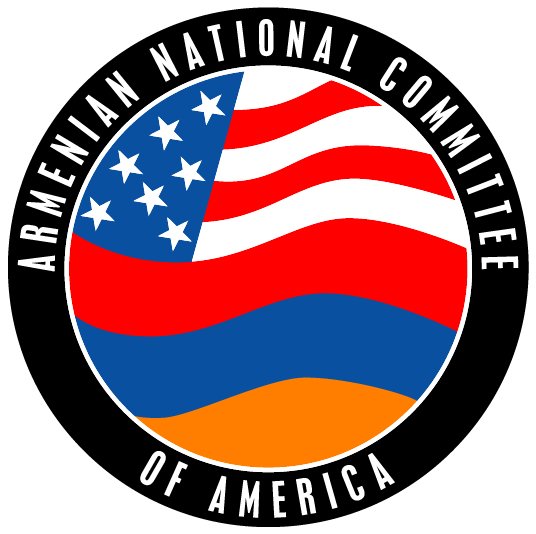
Be the first to comment